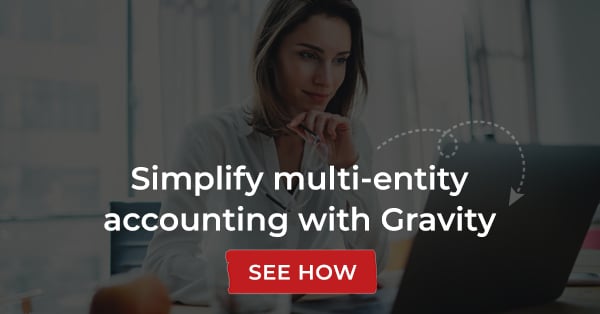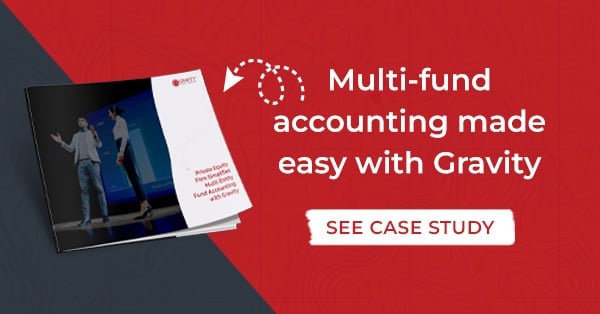Streamline investment management and accounting for Private Equity firms

Managing multiple investments, tracking performance across various entities, and consolidating financial data can be a challenge for private equity firms. As these firms grow and manage more complex portfolios, the need for a streamlined, integrated solution becomes critical. In this post, we’ll explore how Gravity Software can simplify your investment management and multi-entity accounting processes, providing real-time insights, scalability, and automation for private equity firms.
Why investment management and accounting need to be integrated for Private Equity firms
What is integrated Investment Management?
Integrated investment management software combines financial accounting and investment portfolio management into one cohesive system. For private equity firms, this means easily tracking investments, managing financial transactions, and evaluating portfolio performance across multiple entities—all without relying on disconnected spreadsheets or software. Gravity Software integrates these functions, streamlining operations and providing a centralized source of truth for decision-makers.
Challenges Without Integration
Private equity firms often struggle with:
- Manual data entry, leading to inefficiencies and higher chances of errors.
- Slow consolidation of financial data across entities, making real-time decision-making difficult.
- Tracking performance of investments in multiple currencies, which adds complexity.
Without an integrated solution, private equity firms are at risk of missed opportunities, poor visibility, and increased costs due to these inefficiencies. Gravity Software addresses these challenges by offering a unified platform that consolidates investment and accounting processes into one streamlined system.
Key benefits of Gravity Software for Private Equity firms
Seamless consolidation across entities
Gravity Software offers a multi-entity accounting system that consolidates data across all portfolio companies. Whether you’re managing a handful of investments or dozens, Gravity allows all financial data—from individual entities to consolidated reports—to flow seamlessly into a single platform. This means no more manual entry or copying and pasting data across systems, reducing errors and saving time. With real-time reporting, stakeholders can make informed decisions quickly, which is crucial in the fast-paced world of private equity.
Automated intercompany transactions
Tracking capital flows between multiple entities is essential for private equity firms. Gravity Software automates the process of intercompany transactions, ensuring that capital movements between portfolio companies are accurately recorded without manual effort. This automation reduces human errors and ensures that intercompany balances are always up to date.
For example, Gravity can automatically generate the necessary journal entries and invoices, so you no longer need to log into different systems or databases. This streamlined process not only saves time but also ensures that you’re working with accurate, real-time financial data.
Increased transparency and control
With multi-entity accounting, Gravity Software gives your firm greater visibility into each portfolio company’s financial health. This enhanced transparency allows you to evaluate investments both individually and across the portfolio, providing you with a clearer, more holistic view of your firm’s financial position. With real-time insights, you can act faster and more efficiently, making more informed investment decisions.
How Gravity Software specifically helps private equity firms and family offices
Gravity Software’s cloud-based platform is designed to grow with your business, whether you’re managing a few entities or expanding to dozens. Here’s how Gravity specifically supports private equity firms:
Scalability for growth
As your firm grows, Gravity Software adapts to manage multiple entities and complex portfolios. Whether you’re adding new investments, expanding internationally, or acquiring additional companies, Gravity’s platform scales to meet your needs. The software also includes multi-currency capabilities, allowing you to track investments in different currencies, with automatic updates for exchange rates and gains or losses.
Real-time reporting & custom dashboards with Power BI
Gravity Software integrates with Microsoft Power BI, providing real-time financial data and customizable dashboards for each stakeholder. This integration ensures that you can easily generate financial reports and KPIs, tailored to each stakeholder’s needs. Whether you need high-level summaries or detailed analysis of individual investments, Power BI makes it easy to visualize and report on performance in real time.
Comprehensive portfolio management
Gravity allows private equity firms to manage not just financial data but also a wide variety of asset types, including stocks, bonds, private equity holdings, and real estate investments. The platform offers a centralized view of all portfolio investments, simplifying decision-making and improving tracking. Whether you're looking at a single asset or consolidating performance across your entire portfolio, Gravity provides the clarity you need to make informed choices.
Seamless Microsoft 365 integration
Gravity Software integrates fully with Microsoft 365, enabling a collaborative experience for your team. With Excel integration, you can easily export financial data for further analysis, while Microsoft Teams allows your team to collaborate more effectively. Key financial documents are stored securely within the Microsoft ecosystem, ensuring seamless communication and secure data access across your firm.
Real-world success: How Brandon Capital optimized their accounting
Brandon Capital, a private equity firm managing multiple portfolio companies, needed a solution to handle their multi-entity accounting and streamline investment management. Before adopting Gravity Software, Brandon Capital relied on Xero but found it lacked the capabilities required for managing multiple entities and providing real-time consolidated financial data. Their team struggled with inefficiencies, particularly with manual data entry and disconnected systems.
After switching to Gravity Software, Brandon Capital was able to:
- Automate intercompany transactions, reducing time spent on manual entries.
- Consolidate financial data in real-time, improving decision-making speed and accuracy.
- Use Power BI for detailed, real-time reporting and tracking portfolio performance across multiple entities.
The result? A 50% reduction in reporting time and improved accuracy across all financial data, enabling Brandon Capital to make more informed, timely decisions.
Customer testimonial:
“Gravity has a bulk edit function that allows you to change multiple things at one time, which is a huge time-saver.”
— Amy Perkin, CFO at Brandon Capital
Ready to take the next step? Request a demo today
For private equity firms and family offices, managing investments across multiple entities requires a robust, scalable solution. Gravity Software’s integrated investment management and multi-entity accounting system offers a seamless platform for real-time financial reporting, automated processes, and improved decision-making.
Gravity Software is ideal for firms that:
- Manage multiple portfolio companies or investment entities.
- Require real-time insights and customizable financial reporting.
- Need seamless integration with Microsoft tools, such as Power BI, Excel, and Teams.
- Operate internationally and need multi-currency support.
With Gravity Software’s cloud-based platform, you can easily consolidate financial data, streamline accounting processes, and empower your team to work more efficiently. Request a demo today and see how Gravity Software can optimize your firm’s investment management and accounting processes.
Gravity Software
Better. Smarter. Accounting.




